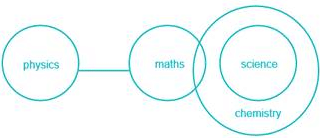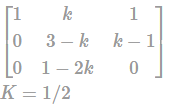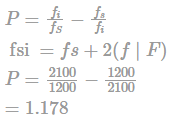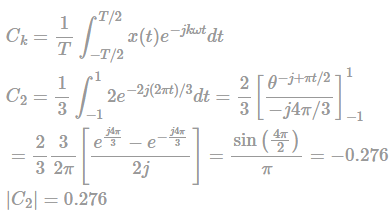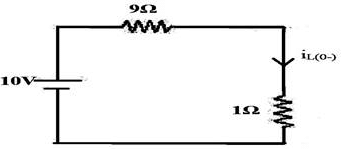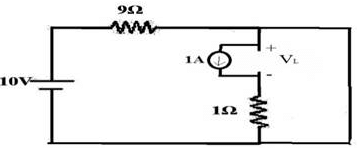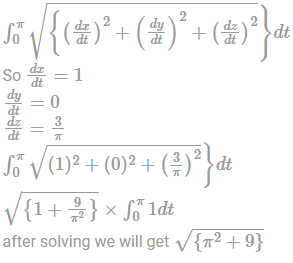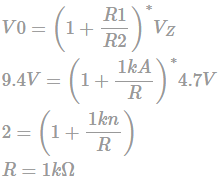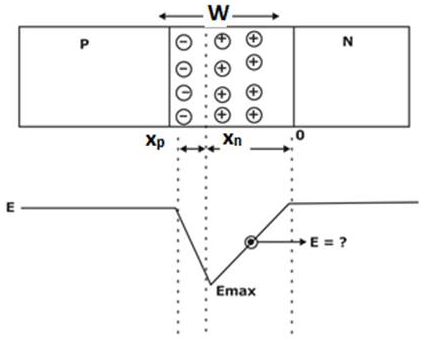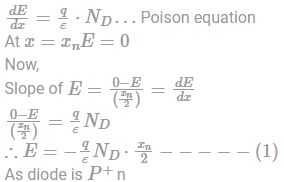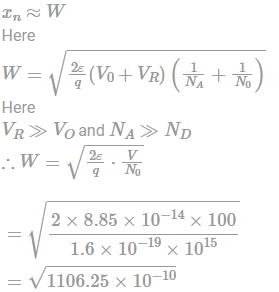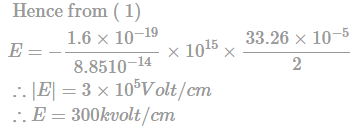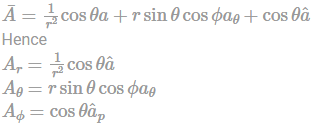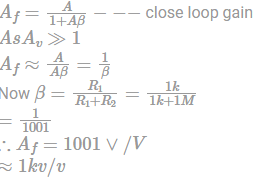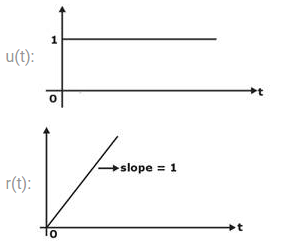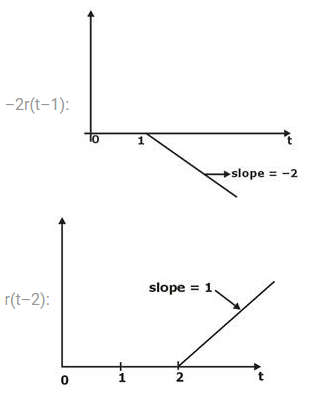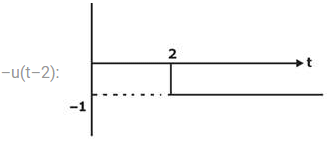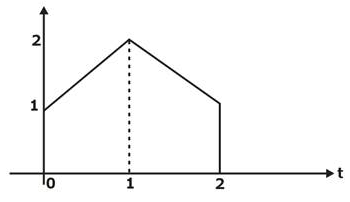Practice Test: Electronics Engineering (ECE)- 15 - Electronics and Communication Engineering (ECE) MCQ
30 Questions MCQ Test GATE ECE (Electronics) Mock Test Series 2026 - Practice Test: Electronics Engineering (ECE)- 15
There are two lines made by joining points A, B,C. B lies between the line joining A and C. Is the distance between the A and C passes through the B more then 7 Km.
I. The distance between A and B is 6 Km
II. Distance between B to C is 7 Km long,
Direction: In the given question, a word/phrase is given followed by three statements; I, II and III. Choose the pair of sentences which can be combined using the given word/ phrase when used at the beginning of the new sentence.
And
I: When Lionel Messi, Ronaldo and Neymar kick and dribble the football, they don’t remain confined to Argentina, Portugal or Brazil, respectively.
II: Let the entire world realise that through sports, especially football, we all can cement our bonds, wash away our bitterness and prejudices.
III: Live with a greater sense of closeness and joy with each other.
Which of the following is the MOST SIMILAR in meaning to Accreditation?
In how many ways can you place 2 white bishops on an empty chess board?
Direction: In the question below are given statements followed by some conclusions. You have to take the given statements to be true even if they seem to be at variance with commonly known facts. Read all the conclusions and then decide which of the given conclusions logically follows from the given statements disregarding commonly known facts.
Statement:
No physics is maths.
Some chemistry is maths.
All sciences are chemistry.
Conclusion:
I. No science is physics.
II. Some physics are science.
III. Some physics are chemistry.
Direction: Read the information carefully and give the answer of the following questions-
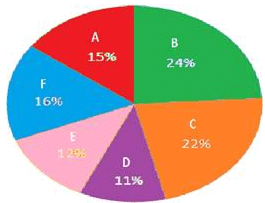
(This pie chart shows the percentage of students appear in six different exams in 2016)
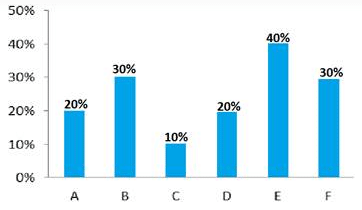
(This bar graph shows the percentage of failed students which appear in these six different exams in 2016)
If in 2016, total number of failed students in exam F was 4080, then how many passed students appears in the exam B?
Direction: Two sentences with two blanks in each, followed by five alternatives with two words in each, are given. Choose that option as the answer which can fill both the blanks of both the sentences.
i. A sinking feeling of panic ________ over them and a temporary paralyzing fear engulfed them ________.
ii. Being a cleanliness freak, she ________ the floor and went down to the market only after the house was _________ clean.
Direction: Five statements are given below, labelled 1, 2, 3, 4 and 5 which are supposed to be in a logical order. A statement labelled P is given thereafter. P can replace one of the five statements such that the four statements along with P would make a coherent paragraph. You have to identify which statement should P replace and then the find out the correct sequence from the options. If the five options are in logical order and form a coherent paragraph/passage, choose the fifth option “12345”.
1) The future of Germany’s coalition government is hanging in the balance after the country’s interior minister reportedly announced his intention to resign over a migration showdown with Angela Merkel.
2) Horst Seehofer, who is also leader of the Christian Social Union, on Sunday night offered to step down from his ministerial role and party leadership in a closed-door meeting in which he and fellow CSU leaders had debated the merits of the migration deal Merkel hammered out with fellow European Union leaders in Brussels.
3) But with CSU hardliners believed to have tried to talk the combative interior minister into staying, a press conference was postponed until Monday, with Seehofer seeking to go back to Merkel in search of a final compromise.
4) At a 2am media conference, Seehofer said he had agreed to meet again with Merkel’s party before he made his decision final.
5) “We’ll have more talks today with the CDU in Berlin with the hope that we can come to an agreement,” Seehofer said.
P. Merkel said on Sunday she wanted the CDU and its Bavarian allies to continue working together.
4 identical solid spheres are melted and re-formed into a solid hemisphere. Then, the ratio of the curved surface area of the hemisphere to half of the surface area of a single sphere is -
A study of people who reduced the calories they consumed has found the strongest evidence yet that such restrictions slow down metabolism, raising hopes that a low calories lifestyle or treatments stimulating biological effects of restricted eating, could prolong health in old age. The report provides the most robust evidence to date that everything we have learnt in other animals can be applied to humans.
Which of the following argument will prove that the above conclusion is flawed?
The value of k such that the system of equation
x + ky + z = 0, x + 3y + kz = 0, 2x + y + z = 0 has non-trivial solution.
The frequency at the output of the following cascaded circuit is …………. Hz

A PCM (Pulse Code Modulation) system uses 8-bit encoder and uniform quantization. What is the maximum bandwidth(in MHz) of the low-pass input message signal for which the bit rate of the system is 20Mbps?
A super heterodyne receiver having RF amplifier is tuned to 1200 kHz, the intermediate frequency is 450 kHz. The quality factor of the tuned circuit at RF amplifier and at the mixer are same and is equal to 65. The image rejection ratio is
Simplify the given Boolean expression
A+AB'+AB'C'+AB'C'D'+AB'C'D'E'+…………………
If the skin depth is 60 µm at 3 MHz in a certain conducting medium then what will be the skin depth if the frequency is changed to 27 MHz?
Find the Standing Wave Ratio of a transmission line of characteristic impedance 80Ω is connected to a load of 100Ω.
Consider the following continuous time signal x(t)
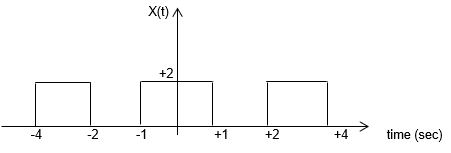
If Ck is the complex Fourier series coefficient of signal x(t). Then the value of |C2| will be
The circuit shown in the figure below is in steady state when switch is closed at t = 0, then the value of
![]()
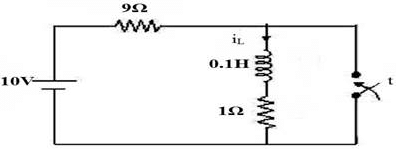
Characteristic equation of a system having unity feedback is
(s + 1)(s - 2)+ k(s - 3)(s + 4). The system is then which of the following?
Consider a spatial curve in 3D space given on parameters form by
X = t
Y = 1
Z = 3t/π in 0 ≤ t ≤ π. The length of the curve is
The modified work function of N-channel MOSFET is -0.8V. The effective positive charge at the Semiconductor oxide layer interface is 9.8 x 10-5 C/m2 and the oxide capacitance is 300 μF/ m2, then calculate the flat band voltage.
In the voltage controller circuit shown in the figure (assume that op-amp is ideal). The BJT has VBE = 0.7V & β is very large and V2 = 4.7V. For a regulated output of 9.4V, the value of R (in kΩ) is
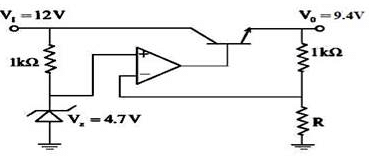
Consider a lossless antenna with a directive gain of +6db. If 1mW of power is fed to it the total power radiated by the antenna will be
The output voltage Vo(in mV) of the circuit shown in figure
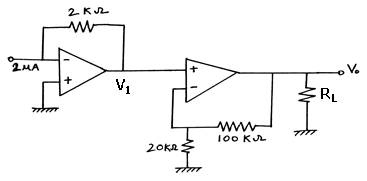
For a given P+ - N Si junction diode with ND = 1015 cm-3 and ni = 1010 cm-3 and e = 8.85 × 10-14 C2/N-cm3. Find the electric field at the midpoint of the depletion region on the n-side. (let reverse bias voltage = 100V)
For the voltage amplifier circuit shown in the figure, Av is very high. Also RS = 1mΩ, RL = 1kΩ R1 = 1 kΩ and R2 = 1mΩ
Then what is the value of |Vo/Vs| = ?
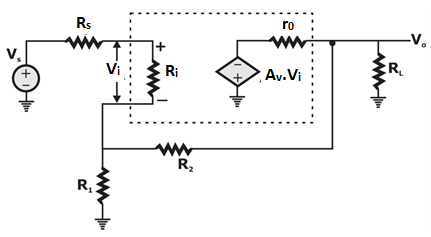
The value of d/dt x(t) at t = 1.5 for x(t) = u(t) + r(t) - 2r(t - 1) + r(t - 2) - u(t - 2) is
Consider an angle modulated signal X(t) = 10.cos [108 πt + Sin 2π 103t]
The maximum frequency deviation is ________kHz?
|
26 docs|263 tests
|



